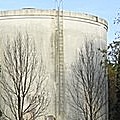- By Dan Veaner
- News
 Print
Print  Lansing Town Board members met with Town Engineer David Herrick Wednesday to get details of a plan to reduce trihalomethane levels in the Emmons Road water tank and at the Cayuga Power Plant. Last week Town Supervisor Kathy Miller told the Board that the Lansing Consolidated Water District is facing up to $100,000 for a permanent solution to keep TTHM levels below mandated levels of 80 parts per billion (ppb). Herrick presented data from detailed monitoring study over the past year that shows higher than acceptable levels during summer months.
Lansing Town Board members met with Town Engineer David Herrick Wednesday to get details of a plan to reduce trihalomethane levels in the Emmons Road water tank and at the Cayuga Power Plant. Last week Town Supervisor Kathy Miller told the Board that the Lansing Consolidated Water District is facing up to $100,000 for a permanent solution to keep TTHM levels below mandated levels of 80 parts per billion (ppb). Herrick presented data from detailed monitoring study over the past year that shows higher than acceptable levels during summer months."It's happening during the warm months when more gas is dissolved in the water," Miller says. "That's what happens -- it' chemistry. In the winter you don't have so much of a problem. With the increase of temperature when the summer months come on, that's when you get more gas dissolved in the water."
Miller says that normal monitoring is conducted each quarter, but for the past year the tank and the power plant, the end-point of Lansing's water district, have been monitored every month, sometimes two or three times in a month. TTHM levels edged above the 80 parts per billion (ppb) cap in July and August. The levels rose to a peak in September with readings of 85 ppb in the Emmons Road tank and 106 ppb at the power plant. The next peak was in early November where plant levels were at 96ppb even though the level in the tank was at an acceptable 80ppb. At other times of year TTHM levels were below 80 ppb.
The fix is required in part because of the elevated TTHM levels, and in part because of a change in state monitoring rules. Miller says that a recent change requires individual monitoring of each tank in the system, rather than the taking of an average to determine whether a water system is in compliance. She says the problem is common in the farthest extremes of water systems, especially when water usage is low.
"Ulysses is having the same problem," she says. "It's the end of the road, so to speak, and you don't use as much water at the end of the road."
Herrick is proposing 'a spray type removal and mixing system' be installed in the Emmons Road tank. A mixer will be installed at the bottom of the tank to help reduce possible freezing that could damage the spray removal system. He says this aerator and mixer type of system has been successful in removing TTHMs in other tank installations. The plan includes adjusting the operation of a nearby pump station, and Herrick says that supplemental monthly monitoring will continue until the Town and Bolton Point Water Commission are satisfied that the problem has been solved.
"It's not in every water tank out there," she says. "It's more in end-point tanks, and for us the Cayuga Power Plant doesn't use as much water."
Herrick notes that the project is the responsibility of the Town, and recommended using capital reserve funds to pay for the new equipment and its installation. The Town Board is considering financing the project along with the Bone Plain Road water tank, a much bigger capital project that is slated to be constructed later this year or early in 2015. That tank will address low water pressure at Whispering Pines and the surrounding neighborhoods. Miller says the Town is obligated to fix the water pressure problem by an agreement between the Town and the Tompkins County Health Department. Last week Deputy Supervisor Sharon Bowman proposed paying for the Emmons Road tank project, then replacing the money when BANs (short term notes) and , later, bonds (long term financing) are taken out for the larger project.
Herrick estimates the cost of equipment and installation in the Emmons Road tank will be about $85,000, and with a 15% contingency budget the entire cost is estimated at about $98,000. Miller says the cost of the new Bone Plain water tank project is still being calculated. Ultimately only water customers bear the cost for the two projects.
"It's part of the consolidated water district," Miller says. "All costs associated with our water district are our expense. Bolton Point makes the water and we have to take care of our infrastructure. So if you don't have water service you don't pay anything for this. If you have water you are, because it's part of the consolidated water district."
The board scheduled a public hearing on the project for May 7th at 6:05pm.
"Even if we didn't do anything, with the levels only being higher a couple of months of the year (it is probably safe)... but why even chance it?" Miller says. "That's the bottom line. If this is the solution, we'll do it."
v10i15



